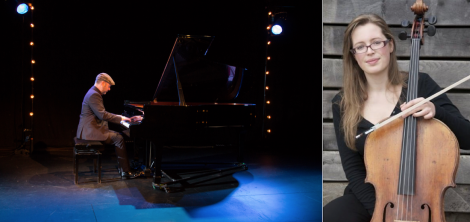Features / A musical exploration of identity and home
SHETLAND Arts’ classical season for 2017-18 is set to begin with a local flavour – an inaugural concert by two of the isles’ most accomplished instrumentalists, Neil Georgeson and Abigail Hayward.
Neil, who helmed a number of well-received concerts last season (all as engaging as they were unorthodox), told Shetland News he was pleased to be returning to Mareel once again with a fellow Shetlander – a situation that heavily inspired this opening concert’s theme.
He will be joined this time by Abigail, a Shetlander who graduated from the Royal Scottish Conservatoire and who has played cello with every major Scottish orchestra, as well as a wide variety of ensembles, chamber orchestras and quartets.
The programme was worked out between the pair of them, although Abigail said that it is very much “a Neil Georgeson-inspired production… with a bit of everything for everyone”.
In Our Homeland will centre around the nationalist movement of the 19th century music scene. The concert is named both for the fact that Neil and Abigail will be returning to play for the local audience, and for Norwegian composer Edvard Grieg’s piece, In My Homeland.
“It’s about national identity and regional identity. [In My Homeland] is great, a really good example of the nationalism trend in classical music.”
The “nationalism trend” was a period of reflection and exploration by a number of 19th century composers, who looked to the musical styles and traditions of their own countries to influence compositions.
Grieg was a leading composer in this movement, drawing heavily from Norwegian folk tunes, culture and folk tales in a number of pieces, such as the famous Peer Gynt suite. Neil described Grieg as ‘underrated’ as a composer, referring to the composer’s rearrangements of traditional fiddle tunes for solo piano as ‘brilliant’.
Become a member of Shetland News
“He speaks to you with it,” Neil said. “It doesn’t sound like Grieg, really.” He added that some of these pieces have been further re-arranged for cello and piano for this concert.
From Grieg, the concert will branch out into other composers whose music explores regional identities and traditions. Other composers include the “intensely Polish” Chopin, Hungarian Brahms (with Sonata No. 1 as opposed to the better known Hungarian Dances), German Schumann (with a number of pieces from the Fantasiestücke piano suite) and minimalist Estonian composer Arvo Pärt.
One notable, if unconventional, example is Peter Sculthorpe, an Australian composer of European descent who drew on indigenous melodies for his piece Djilile. Neil was aware that in the current climate, nationalism is something that’s very much under scrutiny – and he felt that this makes it the perfect theme to explore.
“The interesting thing about nationalism is we see it mostly as a negative thing,” Neil said. “If countries that are oppressed express it, it’s got a sort of emancipatory narrative.”
One composer whose exploration of nationalism is extremely interesting, Neil said, was Anton Webern, an Austrian composer whose enthusiastic engagement with the resurgence of German nationalism and romanticism in the 1930s brought him uncomfortably close to the Third Reich – and whose music was banned by the Nazi government for being “too intellectual” and “degenerate”.
Neil said that he and Abigail would be playing Webern’s entire works for cello and piano, describing them as “crystalline and perfect; quite abstract but very beautiful”. The “complete works” are 12 pieces that will take up little more than five minutes in total.
Another composer featured whose work was influenced by Webern is John Cage, an American composer whose Apartment House 1776 was the pinnacle of American nationalism – being specially commissioned for the country’s bicentennial celebrations in 1976.
Apartment House is a celebration of the US as a “salad bowl” as opposed to a “melting pot”, Neil said. The original compositions featured vocalists of four different backgrounds that symbolised the diversity of the US – black, Jewish, protestant and native American. All singing at once.
“It sounds like it was a bit cacophonous,” Neil noted.
Of the work’s 47 harmonies, Neil and Abigail will be playing eight. Neil said that many of the harmonies are actually colonial tunes that Cage rearranged by removing notes from the original music.
The theme of regional identity is, of course, heavily inspired by the two musicians playing to the audience of their homeland. While Neil has been a familiar face to Shetland music fans of late, Abigail has not played to an isles audience in a number of years.
“[It’s] really nice – it warms the cockles,” she said. “It’s nice looking out onto friendly faces. I hope everyone enjoys it!”
In Our Homeland looks to be an interesting and thoughtful concert, if perhaps a bit less ‘out there’ than some of Neil’s past performances. Neil’s previous concerts have focussed on the exploration of a theme, with music chosen to fit as opposed to just picking crowd-pleasers or catchy tunes.
“‘Catchy’ is overrated,” he said. “But there won’t be any scraping inside a piano or anything like that.”
In Our Homeland will be at Mareel on 7 September starting at 7.30pm. Tickets are priced £16 (£5 for students and under16s) and are available via the Shetland Box Office.
Alex Garrick-Wright
Become a member of Shetland News
Shetland News is asking its readers to consider paying for membership to get additional perks:
- Removal of third-party ads;
- Bookmark posts to read later;
- Exclusive curated weekly newsletter;
- Hide membership messages;
- Comments open for discussion.
If you appreciate what we do and feel strongly about impartial local journalism, then please become a member of Shetland News by either making a single payment, or setting up a monthly, quarterly or yearly subscription.





























































